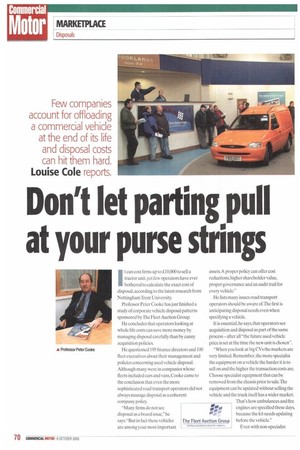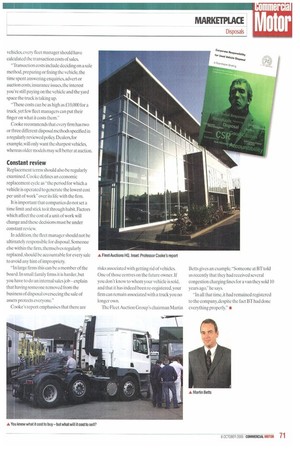Don't let parting pull at your purse strings
Page 72

Page 73

If you've noticed an error in this article please click here to report it so we can fix it.
account for offloading a commercial vehicle at the end of its life and disposal costs can hit them hard.
Louise Cole reports. Few companies
It can cost firms up to 110,000 to sell a tractor unit, yet few operators have ever bothered to calculate the exact cost of disposal, according to the latest research from NottingharnTrent University.
Professor Peter Cooke has just finished a study of corporate vehicle disposal patterns sponsored by The Fleet Auction Group.
He concludes that operators looking at whole life costs can save more money by managing disposal carefully than by canny acquisition policies.
He questioned 195 finance directors and ilk fleet executives about their management and policies concerning used vehicle disposal. Although many were in companies whose. fleets included cars and vans, Cooke came to the conclusion that even the more sophisticated road transport operators did not always manage disposal as a coherent company policy.
-Many firms do not see disposal as a board issue," he says."But in fact these vehicles are among your most important assets. A proper policy can offer cost reductions, higher shareholder value, proper governance and an audit trail for every vehicle."
He lists many issues road transport operators should be aware of.The first is anticipating disposal needs even when specifying a vehicle.
It is essential, he says,that operators see acquisition and disposal as part of the same process — after all "the future used vehicle price is set at the time the new unit is chosen".
"When you look at big CVs the markets are very limited. Remember, the more specialist the equipment on a vehicle the harder it is to sell on and the higher the transaction costs are. Choose specialist equipment that can be removed from the chassis prior to sale.The equipment can be updated without selling the vehicle and the truck itself has a wider market. That's how ambulances and fire engines are specified these days, because the kit needs updating before the vehicle."
Igo
Ma
Even with non-specialist vehicles, every fleet manager should have calculated the transaction costs of sales.
"Transaction costs include deciding on a sale method, preparing or fixing the vehicle, the time spent answering enquiries, advert or auction costs, insurance issues, the interest you're still paying on the vehicle and the yard space the truck is taking up.
"These costs can be as high as £10,000 for a truck , yet few fleet managers can put their finger on what it costs them."
Cooke recommends that every firm has two or three different disposal methods specified in a regularly reviewed policy. Dealers, for example, will only want the sharpest vehicles, whereas older models may sell better at auction.
Constant review
Replacement terms should also be regularly examined. Cooke defines an economic replacement cycle as "the period for which a vehicle is operated to generate the lowest cost per unit of work" over its life with the firm.
It is important that companies do not set a time limit and stick to it through habit. Factors which affect the cost of a unit of work will change and these decisions must be under constant review, In addition, the fleet manager should not be ultimately responsible for disposal. Someone else within the firm, themselves regularly replaced, should be accountable for every sale to avoid any hint of impropriety.
"In large firms this can be a member of the board. In small family firms it is harder, but you have to do an internal sales job explain that having someone removed from the business of disposal overseeing the sale of assets protects everyone."
Cooke's report emphasises that there are risks associated with getting rid of vehicles. One of those centres on the future owner. If you don't know to whom your vehicle is sold, and that it has indeed been re-registered, your firrn can remain associated with a truck you no longer own.
The Fleet Auction Group's chairman Martin Betts gives an example. "Someone at BT told us recently that they had received several congestion charging fines for a van they sold 10 years ago," he says.
In all that time, it had remained registered to the company, despite the fact BT had done everything properly.










































































































































































































